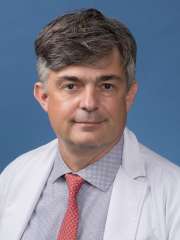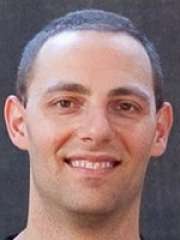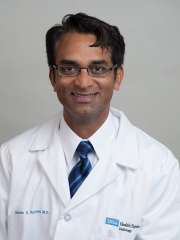Metabolic Syndrome Research
Find your care
Our knowledgeable experts treat obesity and fatty liver disease while improving metabolic health. Call 310-825-2631 to connect with a specialist.
At the center of the obesity epidemic is the metabolic syndrome - a cluster of conditions defined by excess body weight and the dysregulated processing of sugar and lipids (fats and cholesterol). As many as one in three Americans may be at risk for this syndrome, which is considered to herald the leading causes of death: diabetes, heart disease, and stroke. The liver is the workhorse organ for metabolism, so it is no surprise that metabolic syndrome is also closely associated with chronic liver disease. Understanding the relationships among metabolic syndrome and progressive liver disease, inflammation, scarring (fibrosis), and eventually cirrhosis could lead to novel treatments for this fundamental health problem.
The metabolic syndrome research conducted within COMET, is led by Dr. Simon Beaven. It focuses on how alterations of lipid metabolism promote liver damage and insulin resistance/diabetes. The team studies the role of endogenous nutrient receptors, called nuclear receptors, on the development of the component conditions of the metabolic syndrome: fatty liver, diabetes, dyslipidemia (high cholesterol), obesity, and atherosclerosis. Of particular interest is how altered lipid metabolism contributes to the liver's wound-healing response. In the face of any chronic injury, the liver generates scar tissue, a process known as fibrosis, which is mediated by a specialized liver cell called the hepatic stellate cell. Left unchecked, fibrosis can progress to cirrhosis (end-stage liver disease), the need for liver transplantation, and a dramatically reduced lifespan. Currently, there are no anti-fibrotic therapies that specifically target hepatic stellate cells in any liver disease.
Recently, Dr. Beaven made a major breakthrough with the observation that lipid metabolism, through liver X receptor (LXR) signaling, plays an important role in the activation of hepatic stellate cells and contributes to liver fibrosis susceptibility. This unexpected finding has opened up a new field of study - cholesterol metabolism in liver wound healing. A better understanding of how this scarring process occurs could lead to new approaches for slowing or halting the progressive fibrosis that is at the root of all chronic liver diseases, including the metabolic syndrome.
Metabolic syndrome research team

Simon W. Beaven, MD, PhD
Research and Medical Director, Center for Obesity and METabolic Health (COMET)
Director, Metabolic Syndrome Program
Health Sciences Assistant Clinical Professor of Medicine
Vatche and Tamar Manoukian Division of Digestive Diseases and Pfleger Liver Institute
David Geffen School of Medicine at UCLA

Peter M. Clark, PhD
Dr. Clark attended Cornell University, earning highest honors in chemistry, high honors in biology, and honors in mathematics. Dr. Clark earned his PhD in chemistry from the California Institute of Technology where he received the Herbert Newby McCoy Award in Chemistry. His graduate work focused on the post-translational modification N-acetyl-D-glucosamine, which has been implicated in diseases such as diabetes and Alzheimer's disease.

Cynthia Hong, PhD
Dr. Hong received her doctoral degree in biomedical engineering from UCLA in 2008. Subsequently, she completed a post-doctoral training under the mentorship of Dr. Peter Tontonoz in the Howard Hughes Medical Institute and UCLA's Department of Pathology and Laboratory Medicine. Her work focused on understanding the underlying biological mechanisms of cholesterol homeostasis and how molecular perturbations to this balance impact metabolic diseases.

Steven Raman, MD
Dr. Raman is an expert in abdominal and pelvic imaging (CT, MRI, US and X-Ray) and interventional radiology (image guided procedures), especially in the area of tumor ablation and fibroid treatment. He is director of the Abdominal Imaging Fellowship at UCLA, and co-director of the Fibroid Treatment Program at UCLA.